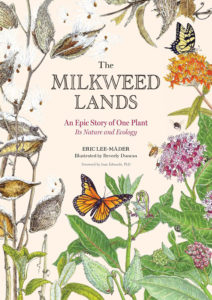Review of Eric Lee-Mäder’s “The Milkweed Lands”
 My pictorial memory was awakened while reading Eric Lee-Mäder’s book, “The Milkweed Lands: An Epic Story of One Plant, Its Nature and Ecology.” His description of the Upper Mississippi River Valley jogged my memories of playing in muddy creeks and wetlands as a kid while running through the pastures in the Driftless Region of Iowa. And as a teenager, I ran along back roads three different summers from Maine to Iowa, Oregon to Iowa and California to Iowa.
My pictorial memory was awakened while reading Eric Lee-Mäder’s book, “The Milkweed Lands: An Epic Story of One Plant, Its Nature and Ecology.” His description of the Upper Mississippi River Valley jogged my memories of playing in muddy creeks and wetlands as a kid while running through the pastures in the Driftless Region of Iowa. And as a teenager, I ran along back roads three different summers from Maine to Iowa, Oregon to Iowa and California to Iowa.
Eric’s description of ditches in our country and the ecosystems they hold rings true. While thumping the pavement at age 14, my mind would wander and think about those living in them. A ditch was always on my right, and I was able to experience the vegetation close up, rather than buzzing by in a car. When I rode in the Register’s Annual Great Bicycle Ride Across Iowa, I’d slow down and actually look at the Earth around us.
Along the RAGBRAI route, the nonprofit Milkweed Matters handed out seed balls for riders to throw in the ditches as they went. I loved this as a participant, and I also love that everyone can help plant milkweed in our ditches. Unfortunately, ditches are difficult habitats for milkweed to thrive, with mowing and spraying happening almost everywhere.
In “The Milkweed Lands,” published in 2023, Eric Lee-Mäder brings to life stories of this plant family and its ecological significance, with captivating illustrations by Beverly Duncan – each one more beautiful than the next. As those who attended PFI’s 2025 Annual Conference recall, Eric was our keynote speaker. In his talk, he empowered us to remember the significance of various species, and the importance of creating space for them – especially milkweed. I left his talk inspired, and wondering how many fence rows we could plant with companion plants that would encourage more wildlife on our certified organic farm. How enough will never be enough.
Milkweed is a group of perennial flowering plants native to regions across the U.S. and Canada. It has many forgotten names and benefits, ranging from medicinal and fiber to habitat for beneficial insects. Some of these things I knew, but many I did not. For instance, I did not realize the vast array of milkweed varieties that exist in nature. It was overwhelming at times learning about them all. When you live in one topography for almost your entire life, you really only learn what you see. Travel humbles you in many ways; for me it’s always the landscape and species of flora that I’m not familiar with.
In the book, Eric explores how so much of our culture was dictated by actions and expectations for us to get rid of weeds. This push led to a 60% decline in the population of milkweed. In just a few years, we ruined generations of ecosystems. Now, with a resurgence of interest in protecting our pollinators, many people seem to be more aware of the implications of getting rid of every “weed.” I like to think a practical farmer understands this.
Reading this book, I learned how important Swamp Milkweed is to the monarch butterfly. This variety is found in the Upper Mississippi River Valley and is what most readers who live east of Interstate 35 are used to seeing. A 2018 Iowa State University research study showed that when given a choice, monarchs prefer the Swamp Milkweed for laying their eggs. Many of us can help these milkweeds proliferate near our farm ponds, waterways and creek beds.
When I started reading, I imagined I’d find a book full of jargon and scientific facts. Instead, I left thinking about the many ways I can incorporate milkweed habitats on our farmland, and if we’re doing enough. The book is a beautiful anthology of how important milkweed is to our ecosystem, our culture and our communities. This is a great book to read at the start of spring and the growing season, as it challenges us to think about what plants are there and how to make our landscapes better. I hope all readers will enjoy “The Milkweed Lands” as much as I did.
Book reviewed by Ellen Walsh-Rosmann
Ellen Walsh-Rosmann farms with her husband, Daniel Rosmann, their two children and Daniel’s family near Harlan, Iowa. Ellen and Daniel also raise hens and sell the eggs to restaurants and grocery stores in Omaha and Des Moines. Ellen is passionate about the food system, revitalizing rural America and food justice work. She founded, owned and operated FarmTable Procurement and Delivery, a local food hub. She and Daniel also own Milk and Honey, a farm-to-table restaurant in Harlan that serves meat and eggs from their farm, as well as vegetables and dairy from local producers.

